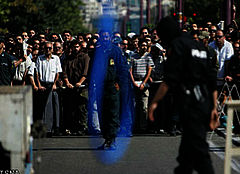70 People Executed in Three Weeks
» With Spring Returned the Executions Machine
Human rights organizations confirm the rapidly rising number of executions in Iran since the end of the Iranian new year (March 21st, 2015) holidays. Seventy individuals have been executed in the last three weeks through decisions of the country’s judiciary. The spokesperson for the Iran Human Rights Organization says most of the victims had been convicted on drug related charges. Others have noted that this coincides with major developments in Iran’s nuclear dossier and talks with the major world powers.
The Human Rights Organization has reported that in a three-day period at least 43 individuals were executed in the country. 42 of them in two prisons of RajaiShahr and Ghezelhesar in the town of RajaiShahr, about 30 miles from the capital city Tehran. It is said that more executions are on the way in the next thirty days. Some of these executions took place individually in public while other in secret. For example, a prisoner was hanged in public view in the city of Shiraz on April 15, 2015. On the same day, five prisoners were also hanged in RajaiShahr prison. Human Rights Organization reports that among them was a man who was younger than 18 years when his life was taken.
300 Executions Since January
Mahmoud Amiri Moghadam, the spokesperson of the organization says that over 300 individuals have been executed in Iran since January this year. Last year, he says, 753 prisoners were executed in Iran.
Flexibility With the West, More Violence in Iran
It was widely expected that the number of executions in Iran would drop as a March deadline for the nuclear talks approached. But according to Moghadam just the opposite has happened. “The nuclear talks have not only not had any positive effect on the rate of executions in Iran, they have in fact accelerated executions,” he said.
But he also says that not only official executions been rising, other forms of violence against prisoners too have been growing. He cites an examples of a prisoner in RajaiShahr who was blinded in his left eye using the Sharia retributive justice known as Ghesas as Iran’s foreign minister and US secretary of state were negotiating the details of a deal. “Normally, such an event would bring an outcry from the international community. Not this time,” said Moghadam.
Officials of the Islamic republic of Iran and some members from the negotiations teams of the major powers have said that the nuclear talks would not include any discussion of human rights issues. It is noted that since nuclear talks between Iran and the international community began over a year ago, violations of human rights in Iran have been less reported internationally.
Shirin Ebadi, Iran’s only Nobel Prize winner had said earlier that human rights activists should not allow arrangements be made with Iran that contravene human rights or the interests of the public.



